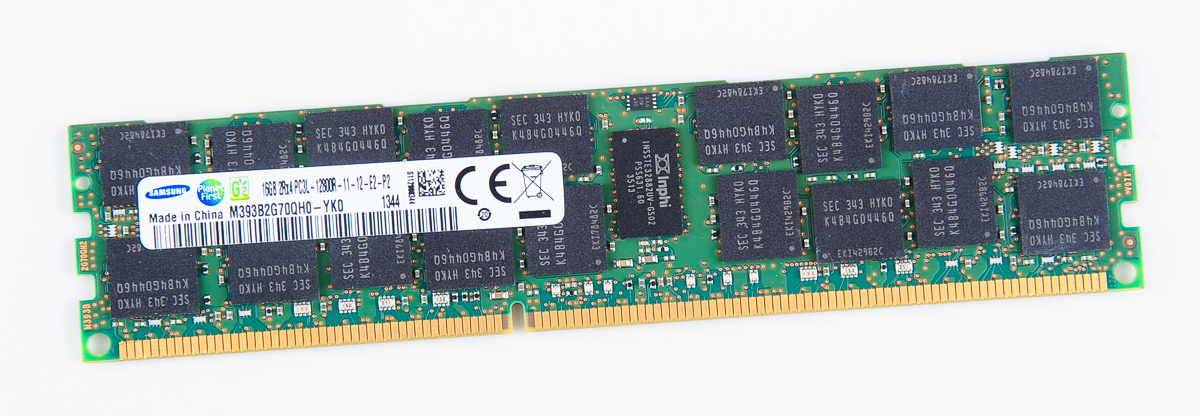DDR3

- SAMSUNG 16GB 2Rx4 PC3L-12800R DDR3 Registered Server-RAM Module R-DIMM REG ECC - M393B2G70QH0-YK0
- 822 in stock
- HP 4GB 1Rx4 PC3L-10600R DDR3 Registered Server-RAM Module R-DIMM REG ECC - 606424-001 / 604500-B21
- 143 in stock
- SK hynix 32GB 4Rx4 PC3-14900L DDR3 Load Reduced Server-RAM Modul LR-DIMM ECC - HMT84GL7AMR4C-RD
- 128 in stock
- HPE 16GB 2Rx4 PC3L-10600R DDR3 Registered Server-RAM Module R-DIMM REG ECC - 632204-001 / 628974-081 / 627812-B21
- 27 in stock
- HPE 16GB 2Rx4 PC3-14900R DDR3 Registered Server-RAM Module R-DIMM REG ECC - 715274-001 / 712383-081 / 708641-B21
- 112 in stock
- IBM 16GB 2Rx4 PC3-12800R DDR3 Registered Server-RAM Module R-DIMM REG ECC - 47J0183 / 00D4970
- 488 in stock
- HP 4GB 1Rx4 PC3-12800R DDR3 Registered Server-RAM Module R-DIMM REG ECC - 664689-001 / 647895-B21
- 4 in stock
- IBM 4GB 2Rx4 PC3-10600R DDR3 Registered Server-RAM VLP Modul REG ECC - 44T1498
- 116 in stock
- HP 4GB 1Rx4 PC3L-10600R DDR3 Registered Server-RAM Modul REG ECC - 664688-001 / 647647-071
- 4 in stock
- SAMSUNG 32GB 4Rx4 PC3-14900L DDR3 Load Reduced Server-RAM Module LR-DIMM ECC - M386B4G70DM0-CMA
- 26 in stock
- ACTICA 4GB 2Rx8 PC3-10600 DDR3 Registered Server-RAM Modul ECC - ACT4GHR72Q4G1333S
- 1 in stock
- SAMSUNG 16GB 2Rx4 PC3L-12800R DDR3 Registered Server-RAM Module R-DIMM REG ECC - M393B2G70DB0-YK0
- 140 in stock
- HP 8GB 1Rx4 PC3-12800R DDR3 Registered Server-RAM Modul R-DIMM REG ECC - 647651-081
- 94 in stock
- SK hynix 16GB 2Rx4 PC3-14900R DDR3 Registered Server-RAM Modul REG ECC - HMT42GR7AFR4C-RD
- 76 in stock
- ELPIDA 16GB 2Rx4 PC3-12800R DDR3 Registered Server-RAM Modul R-DIMM REG ECC - EBJ17RG4BBWD-GN-F
- 1 in stock
- Micron 16GB 2Rx4 PC3L-12800R DDR3 Registered Server-RAM Modul R-DIMM REG ECC - MT36KSF2G72PZ-1G6P1NF
- 1 in stock
- Micron 16GB 2Rx4 PC3-12800R DDR3 Registered Server-RAM Modul R-DIMM REG ECC - MT36JSF2G72PZ-1G6P1KF
- 1 in stock
- Kingston 16GB 2Rx4 PC3-12800R DDR3 Registered Server-RAM Modul R-DIMM REG ECC - KTD-PE316/16G
- 8 in stock
- Micron 16GB 2Rx4 PC3L-12800R DDR3 Registered Server-RAM Modul R-DIMM REG ECC - MT36KSF2G72PZ-1G6E1
- 2 in stock
- Lenovo 16GB 2Rx4 PC3L-12800R DDR3 Registered Server-RAM Modul R-DIMM REG ECC - 46W0674
- 76 in stock
DDR3-RAM as a proven memory standard for servers and workstations
Even today, DDR3 RAM (Random Access Memory) is still a reliable and cost-effective way to expand the RAM of compatible IT systems. As a proven memory technology, DDR3 offers solid performance for servers and workstations that are to continue to be used and adapted to increasing demands. DDR3 memory is often a good choice for companies that want to extend the lifecycle of their existing hardware as much as possible and upgrade it as needed.

What types of DDR3 RAM are available for servers and workstations?
DDR3 memory modules are available in different variants for use in professional IT environments:
ECC & registered DDR3 RAM (RDIMM)
Designed specifically for professional IT systems, this memory offers integrated error correction (ECC: Error Correction Code), which detects and corrects memory errors. RDIMM modules are buffered, enabling higher overall performance in servers with many memory modules installed.
Load-Reduced DDR3 RAM (LRDIMM)
This type of memory reduces the load on the memory controller, enabling LRDIMMs to support higher memory capacities per module and allowing more RAM to be used in a system. This makes them ideal for memory-intensive applications such as virtualisation or operating complex databases.
Unbuffered DDR3 RAM (UDIMM)
Unlike RDIMM and LRDIMM modules, UDIMMs are unbuffered and are therefore suitable for servers and workstations that have to handle less demanding workloads. They offer lower latencies but are limited in terms of maximum memory capacity.
The technical characteristics of DDR3 RAM at a glance
DDR3 was developed as the successor to DDR2 and features several improvements:
- Higher clock rates with speeds up to PC3-14900
- Lower voltage of 1.5V for reduced energy consumption
- Higher capacity of up to 32 GB per module
- 240-pin DIMM slot
What should be considered regarding the compatibility of DDR3 RAM?
The DDR3 standard uses a 240-pin DIMM slot (dual inline memory module) that is not compatible with the older DDR2 standard or the newer DDR4 memory modules. A modified notch in the connector area ensures that DDR3 modules are not accidentally inserted into other memory banks. This prevents damage and ensures a clear distinction between the memory standards. Motherboards must explicitly support DDR3 RAM to allow an upgrade with these modules.
What are the advantages of DDR3 memory for servers and workstations?
In many IT infrastructures, DDR3 RAM is still widely used. Thanks to the high availability of used memory modules, RAM upgrades can be carried out cost-effectively to extend the lifespan of existing IT systems.
- Cost efficiency - used DDR3 modules are significantly cheaper than new memory technologies
- Reliability - ECC error correction minimises memory errors and provides reliable memory performance
- Sustainability - continuing to use DDR3 systems helps to reduce electronic waste
Buy used DDR3 RAM modules at low prices from ServerShop24
In our online shop, you will find a large selection of used DDR3 memory modules for servers and workstations from well-known brands, with which you can cost-effectively adapt the RAM of your systems to increasing demands at an excellent price-performance ratio. All components are available immediately, and fast shipping from our warehouse stock enables short delivery times.
With 15 years of experience, we are your reliable expert for professionally refurbished used servers, storage systems, workstations and network equipment. Do you have questions about configuration options or need advice? Our friendly and experienced support team is here to help.
Contact us - we will find the right memory for your requirements!
















